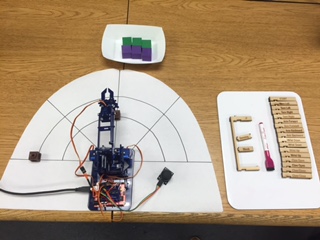RET Site: Cyber Security Initiative for Nevada Teachers (CSINT)
Abstract: This funding establishes a new Research Experience for Teachers (RET) Site at the University of Nevada, Reno (UNR). The primary objective of this RET site is to explore unique ways to engage middle and high school teachers in summer research experiences that emphasize cybersecurity. The teachers will spend six weeks in the summer participating in research experiences and developing classroom modules and materials which will be implemented in their classrooms during the academic year. The UNR team will use inter-personal role-playing and cybersecurity games to help the teachers learn about cybersecurity and its importance to our nation. The project involves a partnership between the university, the school districts in the surrounding Nevada counties, industrial associates, and the Nevada Department of Education. The project will develop a community of teachers who are passionate about cybersecurity and who can translate this excitement to their students through engaging, high-quality inquiry learning experiences. This RET Site is co-funded by the Secure and Trustworthy Cyberspace (SaTC) program.
The project is anchored by a research area this is compelling and exciting for teachers and K-12 students and by faculty team that has demonstrated expertise in both research and education. The goals of the project are to: recruit a cohort of middle and high school teachers interested in introducing cybersecurity and computer science topics into their classrooms; engage the recruited teachers in research experiences with applications in various modern day systems and security; develop instructional modules that can be incorporated into a variety of grades/classes; initiate collaboration and engagement with all schools in Nevada and other stakeholders in the country to promote and disseminate the results to a large group of middle and high school teachers; and sustain long term partnerships between the RET Site teacher participants, the UNR mentor team and industry partners, in order to bring the excitement of computing, problem solving and research to students and encourage them to pursue STEM related careers. The site features projects that are teacher accessible as well as connected to current research and practice. The RET site includes sound evaluation and dissemination plans that will provide models for integrating cybersecurity concepts into the middle and high school curricula. Teachers will develop and hone their research, communication, and presentation skills, all of which are essential to their professional growth and success. The project will build the technical capacity of teachers so they are capable of developing and implementing new, exciting inquiry-based learning activities at their schools. The project team will disseminate the project materials through the TeachEngineering digital library and a dedicated local website and server repository that will be shared with a wider audience of teachers at annual workshops and meetings. The team will also disseminate project results through high-quality journals and professional meetings.
Details
- Organization: National Science Foundation
- Award #: CNS-1542465
- Amount: $540,000
- Date: Sept. 1, 2015 - Aug. 31, 2018
- PI: Dr. Shamik Sengupta
- Co-PI:
Dr. David Feil-Seifer
Supported Publications
- Anderson, M., Miller, B., Kirn, A., Jurkiewicz, M., & Feil-Seifer, D. Making in the Middle: Robots and Sequences. In ScienceScope, Feb 2019. ( details ) ( .pdf )
- Miller, B., Anderson, M., Major, J., Jurkiewicz, M., Kirn, A., & Feil-Seifer, D. Unplugged Robotics to Increase K-12 Students' Engineering Interest and Attitudes. In Frontiers in Education, San Jose, CA, Oct 2018. ( details ) ( .pdf )
- Rand, K., Sengupta, S., & Feil-Seifer, D. Unplugged Robotics as a Platform for Cybersecurity Education in the Elementary Classroom. In Colloquium for Information Systems Security Education, New Orleans, LA, Jun 2018. ( details ) ( .pdf )
Supported Projects
Robotics in the Classroom Jan. 1, 2014 - Present
 Robotics represents one of the key areas for economic development and job growth in the US. However, the current training paradigm for robotics instruction relies on primarily graduate study. Some advanced undergraduate courses may be available, but students typically have access to at most one or two of these courses. The result of this configuration is that students need several years beyond an undergraduate degree to gain mastery of robotics in the academic setting. This project aims to: alter current robotics courses to make them accessible for lower-division students; increase both the depth and breadth of the K-12 robotics experience; increase the portability of robotics courses by disseminating course materials online, relying on free and open-source software (FOSS), and promoting the use of simulators and inexpensive hardware. We will team with educators to study the effectiveness of the generated materials at promoting interest in robotics, computing, and technology at the K-5, 6-8, 9-12, and undergraduate grade levels.
Robotics represents one of the key areas for economic development and job growth in the US. However, the current training paradigm for robotics instruction relies on primarily graduate study. Some advanced undergraduate courses may be available, but students typically have access to at most one or two of these courses. The result of this configuration is that students need several years beyond an undergraduate degree to gain mastery of robotics in the academic setting. This project aims to: alter current robotics courses to make them accessible for lower-division students; increase both the depth and breadth of the K-12 robotics experience; increase the portability of robotics courses by disseminating course materials online, relying on free and open-source software (FOSS), and promoting the use of simulators and inexpensive hardware. We will team with educators to study the effectiveness of the generated materials at promoting interest in robotics, computing, and technology at the K-5, 6-8, 9-12, and undergraduate grade levels.
Social Impact of Long-Term Cooperation With Robots July 1, 2013 - Present
SAR envisions robots acting in very human-like roles, such as coach, therapist, or partner. This is a sharp contrast from manufacturing or office assistant roles that are more well-understood. In some cases, we can use human-human interaction as a guide for HRI; in others, human-computer interaction can be a suitable guide. However, there may be cases where neither human-human nor human-computer interaction provide a sufficient framework to envision how people may react to a robot over a long term. Empirical research is required in order to examine these relationships in more detail. Preliminary work suggests that a person sometimes views a robot as very machine-like, but others suggest that a robot can take on a social role. Long-term interaction between humans and robots might also expose previously unforeseen challenges for creating and sustaining relationships. Experiment design experts suggest that participants in lab studies might subconsciously change their reactions to the robot given certain assumptions that arise from being in a research setting. This could have ramifications for in-lab research related to lt-HRI, requiring out-of-lab validation as well. This objective will study these and other social factors related to lt-HRI to observe how they may impact acceptance and cooperation.
